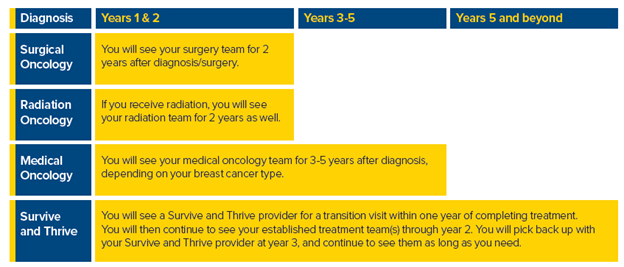Breast Survivorship Program
The Wilmot Cancer Institute at Pluta offers specialized care for breast cancer survivors through the Breast Survivorship Program, where a team of trained advanced practice providers address unique concerns and provide breast exams and surveillance imaging. This new initiative was designed to seamlessly transition patients from their primary treatment team to a dedicated breast cancer survivorship team.
Nurse practitioners and physician assistants serve to help patients transition the focus from surviving through active treatment to thriving in survivorship and will include a review of the following:
■ Diagnosis and treatment history
■ Treatment-related side effects
■ General health maintenance
■ Risk reduction for secondary cancers
■ Sexual wellness and intimacy
■ Community resources for ongoing support after treatment
The clinic's mission is to improve survivors' lives by advocating for personalized, comprehensive, high-quality care during the survivorship phase.
Survivorship Phases

For the first two years, patients will begin to see survivorship providers six to 12 months after diagnosis, while also seeing their oncology treatment team if necessary. During years three to five after diagnosis, a patient will see a survivorship provider and, depending upon the type of breast cancer, may also continue to visit a medical oncologist. At five years of survivorship and beyond, patients will be supported by the survivorship team, and will be able to receive full physical examinations and assistance with obtaining breast imaging. To make an appointment, please call: (585) 487-1700.
Palliative care
At Wilmot Cancer Institute, physicians from UR Medicine’s Palliative Care Program are key members of the care team, and they provide outpatient care at many of our locations, including Comprehensive Breast Care at Pluta. Palliative care focuses on alleviating the pain and symptoms — such as nausea and shortness of breath — that can come with a serious illness like cancer and its treatment. Sometimes confused with hospice, palliative care can accompany any and all desired medical treatment for cancer or other conditions. It is about helping those facing cancer and their families live better while they’re undergoing treatment.